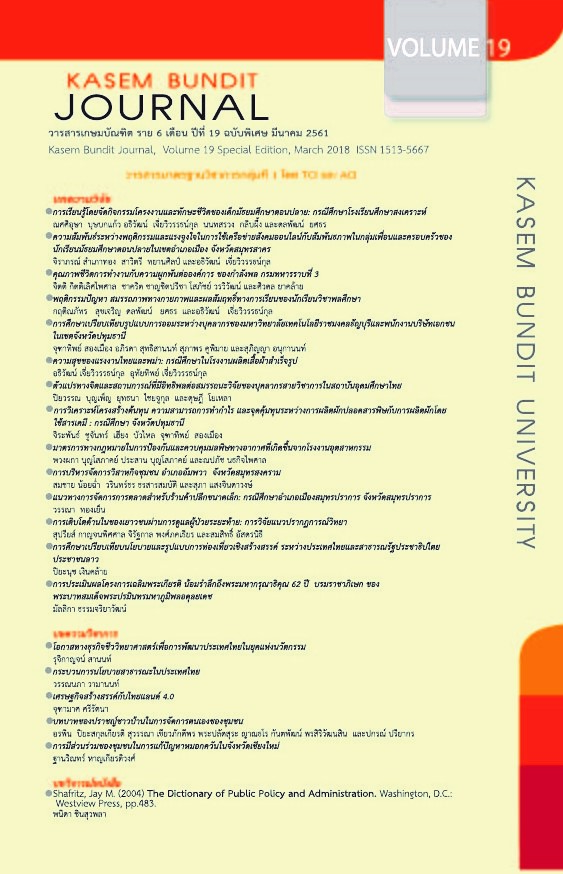พฤติกรรมปัญหา สมรรถภาพทางกายภาพและผลสัมฤทธิ์ทางการเรียนของนักเรียนวิชา พลศึกษา
Keywords:
พัฒนาการวัยเด็กตอนปลาย, ผลสัมฤทธิ์ทางการเรียนวิชาพลศึกษา, สมรรถภาพทางกายAbstract
การศึกษาครั้งนี้ มีวัตถุประสงค์เพื่อศึกษาพฤติกรรมปัญหา สมรรถภาพทางกาย และผลสัมฤทธิ์ ทางการเรียนวิชาพลศึกษา ของนักเรียนชั้นประถมศึกษาปีที่ 6 โรงเรียนแห่งหนึ่ง ในจังหวัดฉะเชิงเทรา โดย ใช้แบบสอบถามและแบบทดสอบสมรรถภาพทางกายเป็นเครื่องมือในการเก็บรวบรวมข้อมูล โดยเลือกกลุ่ม ตัวอย่าง จ านวน 90 คน แบบเจาะจง ผลการศึกษาพบว่า สมรรถภาพทางกายมีการเปลี่ยนแปลงระหว่างปี การศึกษา ดัชนีมวลกายมีผลต่อสมรรถภาพทางกายอย่างมีนัยส าคัญที่ระดับ ≤.05 ผลสัมฤทธิ์ทางการเรียน วิชาพลศึกษาของนักเรียน มีความสัมพันธ์ทางลบกับคะแนนรวมพฤติกรรมที่เป็นปัญหา (ด้านอารมณ์ ความ ประพฤติเกเร สมาธิสั้น และความสัมพันธ์กับเพื่อน) แต่เมื่อพิจารณาพฤติกรรมรายด้านที่เป็นปัญหา พบว่า ด้านที่มีความสัมพันธ์ทางลบกับผลสัมฤทธิ์ทางการเรียนวิชาพลศึกษา ได้แก่ พฤติกรรมอยู่ไม่นิ่ง/ สมาธิสั้น และพฤติกรรมเกเร/ ความประพฤติ อย่างมีนัยส าคัญทางสถิติที่ระดับ ≤0.05 ผู้ที่เกี่ยวข้องทุกฝ่าย จึงควร สนใจและให้ความส าคัญกับการเรียนวิชาพลศึกษา และการประเมินสมรรถภาพทางกาย ทั้งนี้ เพื่อช่วย กระตุ้นและส่งเสริมให้นักเรียนระดับประถมศึกษาได้มีพัฒนาการด้านร่างกาย จิตใจ และสังคมที่สมวัย อย่างมีประสิทธิภาพ
The main objectives of this research were to study problematic behavior and the relationship among problematic behaviour, physical capability, and physical education learning achievement of grade 6 students in a school in Chachoengsao Province. Questionnaire and physical fitness test were applied to collect data from 90 students selected by purposive sampling method. The study revealed that physical capacity of students changed over the academic years. Body mass index affected physical fitness significantly at ≤0.05 level. Physical education learning achievement of the students was negatively related with total score of problematic behaviour (in terms of their emotion, unruly behaviour, attention deficit hyperactivity disorder or ADHD and relationship with their peers), specially physical education learning achievement being negatively related with hyperactivity/ADHD and unruly behavior significantly at p ≤.05. It was suggested that attention and focus should be paid on physical education learning and physical fitness evaluation in order to promote and encourage physical, mental and social development among primary school students.
References
2. Yodsalee, Chanida. (2559). Factors Affecting Learning Achievement of Students in Schools under Prachuap Khiri Khan Primary Educational Service Area Office 2. Master of Education Program in Educational Administration, Phetchaburi Rajabhat University.
3. Boonma, Chitinthree. (2552). A Physical Education Instructional Model Based on Brain-Based Learning Approach to Enhance Learning Development and Skill-Related Physical Fitness of First Grade Students. Doctor of Philosophy Program in Physical Education, Chulalongkorn University.
4. Saksiriphol, Daranee. (2556). The Study to Identification of Attention of Deficit Hyperactivity Disorders in Children with Learning Disabilities. Master of Education (Special Education). Bangkok: Graduate School, Srinakharinwirot University
5. Davis, C.L. (2012). Exercise Improves Executive Function and Achievement and Alters Brain Activation in Overweight Children: A Randomized, Controlled Trial. Health Psychology. 30(1), 91-98.
6. Department of Health. (2556). Annual Report 2555. Bureau of Health Promotion. Department of Health.
7. Golle, K. (2015). Physical Fitness Percentiles of German Children Aged 9-12 Years: Findings from a Longitudinal Study.
8. Institute for Population and Social Research, Mahidol University. (2557). Thai Health Report “Self-Managing Communities: Foundation of National Reform”. Nakhon Pathom: Institute for Population and Social Research, Mahidol University.
9. Siriprasert, Jirakorn. (2543). Skills and Teaching Techniques for Physical Education in Primary Educational. Bangkok, Chulalongkorn University.
10. S, Koltrakul, (2550). Educational Psychology. (7th). Bangkok: Chulalongkorn University press.
11. Maopech. Kultida. (2553). The Development of a Physical Education Instructional Model Based on Theory of Multiple Intelligences to Improve Physical Education Learning Achievement of Elementary School Students. Doctor of Philosophy Program in Physical Education, Chulalongkorn University.
12. Peungposop, Narisara. (2551). Study of Risk Factors Affecting Overnutrition Among School Children in Bangkok. Doctor of Philosophy Program in Demography, Chulalongkorn University.
13. Nattiyaporn Yokubon. (2555). Factors Affecting the Academic Achievement of Sciences Subject of Students in Grade 6 at The Demonstration School under The Jurisdiction of The Office of Higher Education Commission, The Ministry of Education. Journal of Education and Social Development, 8(1), 85-102.
14. Kotchabhakdi, Nittaya. (2551). Development and Child behavior. Bangkok: Holistic-Publishing.
15. Sirivunnabood, Panthip. (2556). Psychosocial Development. Bangkok: Chulalongkorn University.
16. Kaewfai, Pornpun. (2556). Factors Affecting Student Achievement of Banhouychun School Lunder The Srakaeo Primary Educational Service Area Office 2. Master of Education (Educational Administration), Burapha University.
17. Saidi, Asri. (2554). A Propose of the Elementary School Physical Education Program in Three Southern Border Province. Master of Education (Health and Physical Education). Bangkok: Chulalongkorn University
18. Chanabamrung. Sarawut. (2555). The Development of a Student Behavior and Academic Achievement tendency prediction system. Master of Information Science in Information Technology. Nakhon Ratchasima: Suranaree University.
19. Ruennarong, Sarun. (2553). Factors Affecting on Attitude towards Physical Education Learning of the Second Level, Primary Grades 4-6 Students at Kasetsart University Laboratory School, Center for Educational Research and Development in Jatujak District, Bangkok, Master of Education (Educational Psychology). Bangkok: Graduate School, Srinakharinwirot University.
20. Pongpetra, Sumeth. (2553). Factors Affecting on Interpersonal Relationship with
Friends of the Fourth Level, Secondary Grades 4-6 Students at Sarasas
Ektra School in Yannawa District. Bangkok. Master of Education (Educational
Psychology). Bangkok: Graduate School, Srinakharinwirot University.
21. Samahito, Supitr. (2555). Construction of Health-Related Physical Fitness Tests and Norms for Thai Children of Age 7-18 Years: The Department of Physical Education. Bangkok. Sapachanya printing
22. Suphavimon, Teera. (2551). Satisfaction of Secondary Students in the Schools Under the Local Administration of Angthong Province Towards the Teaching approaches of Health and Physical Education in Academic Year 2007. Master of Education (Physical Education). Bangkok: Graduate School,
Srinakharinwirot University.
23. Katawanich, Termsak. (2546). General Psychology. Bangkok: SE-Education.
Kaewchuenchai, Thawatchai. (2557). Classroom Report “Study of Physical Fitness of Primary Grades 6 Students at Assumption College Sriracha, Chonburi Province”. Learning Area of Health and Physical Education, Chonburi
24. Pochanajun, Thityada. (2559). A Development of Behavior Problem Scale for the Elementary School Children in Bangkok. SDU Research Journal. 13(1), 91-111.
25. Srisamoot, Weerasak. (2557). A Comparison of Physical Education Learning Achievements on “Football Basic Skills” and of Emotional Controls among Prathom Suksa 6- Students through Jigsaw Cooperative Learning Management versus Traditional Learning. Nakhon Phanom University Journal, Vol.4 (3). 114-123
Downloads
Published
How to Cite
Issue
Section
License
ทัศนคติ ความคิดเห็นใด ๆ ที่ปรากฏในวารสารเกษมบัณฑิตฉบับนี้เป็นของผู้เขียน โดยเฉพาะ มหาวิทยาลัยเกษมบัณฑิตและบรรณาธิการ ไม่จำเป็นต้องมีความเห็นพ้องด้วย







